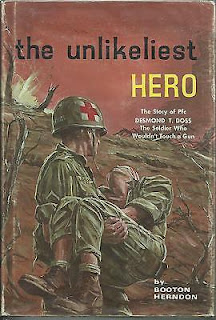Wednesday, July 27, 2016
The Unlikeliest Hero
When I was a boy I loved to read. My favorite place was the Public Library in Longmont, Colorado. During the time I was going to school in Longmont, I read just about every book in the kids section of the library. I still remember being disappointed that I was only allowed to check out three books at a time. I also didn't understand why I couldn't check out books from the adult section on my kid's library card. I would take my three books home and have them read in a day or two and then begged my Mama to take me back to the library. I kept a flashlight handy for reading after I was supposed to be asleep. The Longmont Public Library was my access to knowledge.
One of the books that I read that made a big impression on me was The Unlikeliest Hero by Booton Herndon. It was the story of Desmond T. Doss, the first Conscientious Objector in American history to be awarded the Medal of Honor. During a battle in Okinawa, Japanese soldiers shot at Desmond, an uncovered, unarmed man for 12 hours as he helped wounded soldiers. According to his commander, Desmond saved 100 wounded American soldiers. Desmond said that it was probably only 50 wounded men that he saved so they compromised, and the official record states that he saved 75 lives.
Desmond Doss died on March 23, 2006. The March 25th issue of The New York Times contained an article by Richard Goldstein with the headline, "Desmond T. Doss, 87, Heroic War Objector, Dies." The article told of Desmond's heroism. "Private Doss was accompanying troops in the battle for a 400-foot-high ridge on Okinawa, the Maeda Escarpment, on Saturday, May 5 -- his Sabbath -- when the Japanese counterattacked. Many of the Americans were driven off the ridge, but wounded soldiers were stranded atop it.
Private Doss remained with the wounded, and, according to his Medal of Honor citation, he refused to seek cover, carrying them, one by one, in the face of enemy fire. He lowered each man on a rope-supported litter he had devised, using double bowline knots he had learned as a youngster and tying the makeshift litter to a tree stump serving as an anchor. Every wounded man was lowered to a safe spot 35 feet below the ridgetop, and then Private Doss came down the ridge unscathed.
After engaging in additional rescue efforts under fire over the next two weeks, Private Doss was wounded by a grenade that riddled him with shrapnel. He cared for his injuries alone for five hours, rather than have another medic emerge from cover to help him. While he was finally being carried off on a litter, he spotted a soldier who seemed worse off. He leaped off the litter, directing his aid men to help the other soldier.
Soon after that, Japanese fire hit him, and he suffered a compound arm fracture. He bound a rifle stock to his shattered arm as a splint, evidently the closest he ever came to handling a weapon and crawled 300 yards to an aid station."
President Harry S. Truman presented him with the Medal of Honor on Oct. 12, 1945, for his actions on Okinawa. The citation said that "he was a company aid man when the 1st Battalion assaulted a jagged escarpment 400 feet high As our troops gained the summit, a heavy concentration of artillery, mortar and machinegun fire crashed into them, inflicting approximately 75 casualties and driving the others back. Pfc. Doss refused to seek cover and remained in the fire-swept area with the many stricken, carrying them 1 by 1 to the edge of the escarpment and there lowering them on a rope-supported litter down the face of a cliff to friendly hands.
On 2 May, he exposed himself to heavy rifle and mortar fire in rescuing a wounded man 200 yards forward of the lines on the same escarpment; and 2 days later he treated 4 men who had been cut down while assaulting a strongly defended cave, advancing through a shower of grenades to within 8 yards of enemy forces in a cave's mouth, where he dressed his comrades' wounds before making 4 separate trips under fire to evacuate them to safety.
On 5 May, he unhesitatingly braved enemy shelling and small arms fire to assist an artillery officer. He applied bandages, moved his patient to a spot that offered protection from small arms fire and, while artillery and mortar shells fell close by, painstakingly administered plasma. Later that day, when an American was severely wounded by fire from a cave, Pfc. Doss crawled to him where he had fallen 25 feet from the enemy position, rendered aid, and carried him 100 yards to safety while continually exposed to enemy fire.
On 21 May, in a night attack on high ground near Shuri, he remained in exposed territory while the rest of his company took cover, fearlessly risking the chance that he would be mistaken for an infiltrating Japanese and giving aid to the injured until he was himself seriously wounded in the legs by the explosion of a grenade. Rather than call another aid man from cover, he cared for his own injuries and waited 5 hours before litter bearers reached him and started carrying him to cover. The trio was caught in an enemy tank attack and Pfc. Doss, seeing a more critically wounded man nearby, crawled off the litter; and directed the bearers to give their first attention to the other man.
Awaiting the litter bearers' return, he was again struck, this time suffering a compound fracture of one arm. With magnificent fortitude, he bound a rifle stock to his shattered arm as a splint and then crawled 300 yards over rough terrain to the aid station. Through his outstanding bravery and unflinching determination in the face of desperately dangerous conditions Pfc. Doss saved the lives of many soldiers. His name became a symbol throughout the 77th Infantry Division for outstanding gallantry far above and beyond the call of duty."
The book, The Unlikeliest Hero, and the story of Desmond Doss has been on my mind recently because of a couple of events. His story is being made into a major motion picture. Mel Gibson is directing the film, Hacksaw Ridge, with Andrew Garfield playing the role of Desmond Doss. The film is in post-production and is supposed to be released in November. I will be interested in seeing how this gentle man will be portrayed.
In 1999 I had the honor of listening to Desmond Doss speak to a group of young people. I had taken a group of young boys, ages 10 to 14, to hear him. After his talk, my boys wanted to meet him. We waited for a chance to talk to him. Desmond stayed until everyone who wanted to meet him had a chance. He took the time to visit with each one of the boys personally after he talked. The boys loved him and were very impressed. They said to me, "we got to meet a real American hero."
This week, Desmond Doss was the subject of the podcast, Stuff You Missed in History Class. As I listened to his story I remembered reading The Unlikeliest Hero when I was a boy and I remembered meeting him and how gracious and patient he was with a group of young boys. I'm proud to have been able to meet this gentle man. His story made an impression on me when I was a boy, and when I met him I was impressed by his humility. Even though everyone in the audience wanted to hear about his medal of honor, he was uncomfortable talking about his actions. He focused more on being prepared and being willing to help others. He stressed the importance of standing up for your convictions.
He may have been the unlikeliest hero, but he is definitely an American hero.
Subscribe to:
Post Comments (Atom)




















A beautiful hero and an inspiring story.
ReplyDelete